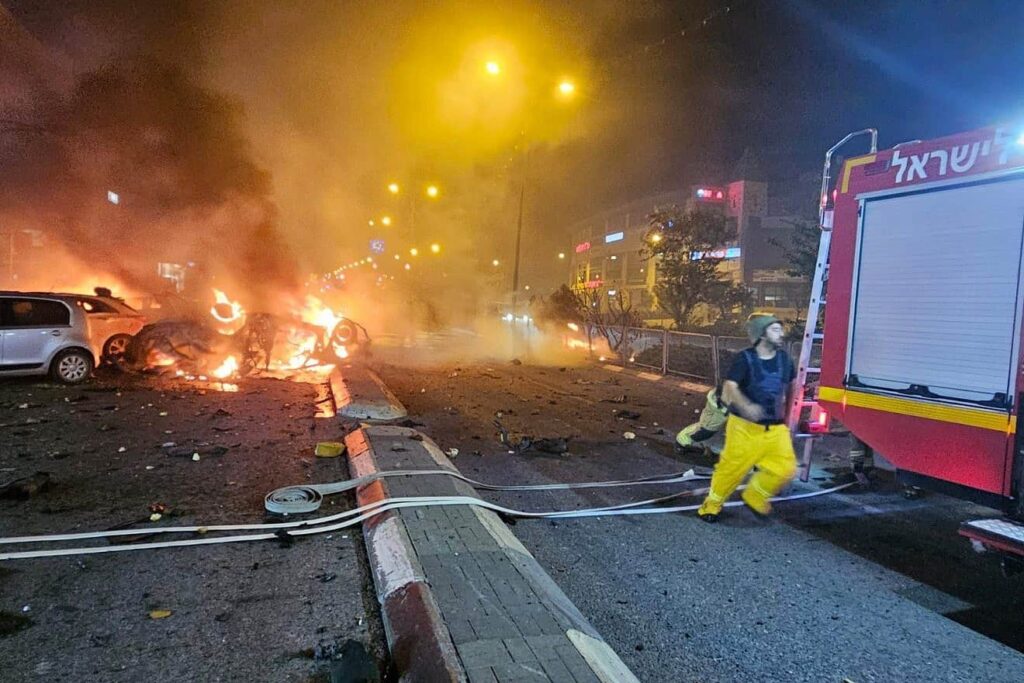
Kiryat Shmona mayor: ‘No one will return’ until Hezbollah is removed from border
Mayor Avihai Stern tells JNS, “We saw what happened in the south. We are not prepared to be abandoned.”
“We normally have 24,000 residents in the city. Currently there are 3,000 residents in the city and 21,000 scattered throughout the country in over 200 hotels across Israel,” says Kiryat Shmona Mayor Avihai Stern.
Since the early 1970s, the city has become accustomed to being on the front lines of Israel’s struggle to secure its northern border. Kiryat Shmona has absorbed rocket launches from Lebanon, terrorist infiltration and the constant tension of living meters from Hezbollah.
But the current war against Hamas changed everything. Hezbollah has joined in the fighting, firing rockets and mortars across the border, and there is always the threat of an Oct. 7-style invasion.
So, for the first time in the city’s history, an evacuation order was given and the residents left for hotels and other accommodations elsewhere.
“There were some who left independently to their families,” Stern tells JNS. “But overnight we became a hotel council—an authority spread over 500 kilometers from Kiryat Shmona in the north to Eilat in the south. We were the last to have been given the evacuation order, so unlike the city of Sderot in the south, which was also evacuated and its residents concentrated in two places, we are concentrated in many more hotels.”
(Source: JNS)
JNS: What are the obstacles to giving the residents basic services, like health and education?
Stern: It was difficult because overnight we had to provide remote services. We are quite a big city, not built for this like local authorities that are based on small groups. I am based on an urban system and suddenly I need to change to a small groups settlement system. I must split my employees between the 200 hotels. It’s a tremendous problem. In places where there are big concentrations, like in Eilat and Tel Aviv, we opened schools from scratch. Now we are building such a school in Tiberias. We divided the city into districts. For each district, we appointed an official who will be in charge of the education issue. We are trying to take control of the event. It’s not perfect, but it’s what can be done under the circumstances.
JNS: You recently met with the chief of the general staff of the Israel Defense Forces. What’s your feeling after the meeting? Did you get a sense of when you’ll be able to return?
Stern: If you ask me, and I am the voice of the residents, I hear the residents say that as long as the Radwan Force [Hezbollah’s “special operations” unit] are sitting on the border, no one will return. We saw what happened in the south. We don’t want a repeat of the atrocities committed by 1,500 Hamas terrorists. We don’t want to imagine what the Radwan Force, which is like an army, can do—what would have happened here and how it would have ended. Let us not go like lambs to the slaughter! We know and see the threat. Until it is removed, it is impossible to live here.
JNS: Is that what you hear, that the people will not return until the Radwan Force is removed from the border?
Stern: Right. I’ll tell them not to come back. Listen, the residents of Kiryat Shmona are Zionists who came to settle on the border and be Israel’s protector for years. We had missiles fired at us; that hasn’t deterred us. But a scenario in which thousands of armed terrorists infiltrate—no resident knows how to deal with it. It’s the state’s job to protect us. We are ready to continue settling, we are Zionist, but the role of the state is to protect us from such a risk. We saw what happened in the south. We are not prepared to be abandoned.

JNS: When you hear the promises from officials, are you calmer?
Stern: I’m not calm. We have been living away from our homes for the last 50-plus days. People can’t work and don’t have a normal education framework. There are welfare needs. This is not a pleasant situation. People left a month ago with summer clothes. Now they have to change their wardrobe to winter clothes. I sent buses out of Eilat so that people can go home to change clothes. They arrive for an hour or two, in coordination with the army—it’s an unpleasant situation. We want to come back here and continue to live our story. The scenario was always that it would happen in the north, but when it happened in the south, it showed us how unprepared we are.
JNS: Do you believe the situation will change?
Stern: It must change. I don’t know how, because I’m not with the IDF chief of staff. But things cannot stay as they are right now. They must change.
The post Kiryat Shmona mayor: ‘No one will return’ until Hezbollah is removed from border appeared first on Israel365 News.
Israel in the News